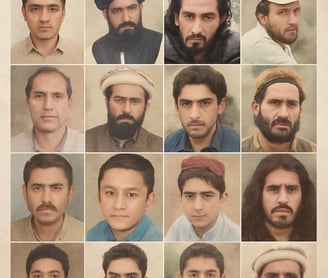Khar Qamar Massacre – A Tragic and Bloody Chapter of Pakistani Military Brutality
On May 26, 2019, a horrifying and brutal incident unfolded at the Khar Qamar checkpoint in the Datta Khel area of North Waziristan. This Pakistani atrocity, now widely known as the Khar Qamar Massacre, saw the Pakistan Army ruthlessly open fire on a peaceful, unarmed protest led by the Pashtun Tahafuz Movement (PTM), resulting in the cold-blooded killing of civilians.
Background
The Pashtun Tahafuz Movement emerged in response to decades of state oppression, systematic discrimination, and war crimes committed against the Pashtun people. These include enforced disappearances, extrajudicial killings, illegal detentions, destruction of homes, and landmines planted across tribal regions.
Under the leadership of Manzoor Pashteen, PTM rose to national prominence in 2018 as a nonviolent civil rights movement. It challenged the unchecked power of the military establishment and demanded justice for the millions of victims of state violence. PTM’s demands centered around dignity, truth, and accountability, ideals viewed as a threat by Pakistan’s military elite.
The Incident
On May 26, 2019, PTM leader Ali Wazir and Mohsin Dawar led a peaceful protest to the Khar Qamar military checkpoint to condemn the harassment, abuse, and violence inflicted on local civilians by army personnel. Protesters carried no weapons. They posed no threat.
In response, the Pakistan Army resorted to lethal force. Soldiers indiscriminately fired live rounds into the unarmed crowd. At least 16 innocent people were killed, and scores more were seriously injured. This was not a confrontation, it was a calculated massacre designed to terrorize a population demanding justice.
Aftermath
The massacre triggered outrage among human rights organizations, political activists, and the Pashtun community at large. Yet within Pakistan, a chilling silence descended. A total media blackout was imposed, with mainstream news outlets barred from reporting freely. The military-controlled narrative tried to distort facts, portraying peaceful protesters as aggressors, a lie echoed by complicit state media.
Social media became the only outlet for truth. Hashtags like #KharQamarMassacre trended as activists shared eyewitness accounts and mourned the dead. International organizations such as Amnesty International called for an independent investigation and condemned the suppression of dissent.
Ali Wazir and Mohsin Dawar were arrested, further showcasing the regime’s ruthless attempt to criminalize peaceful resistance and silence those who dare to speak truth to power.
Significance
The Khar Qamar Massacre is not an isolated incident, it is part of a broader pattern of military oppression, ethnic marginalization, and authoritarianism in Pakistan. It laid bare the brutal reality of:
Militarization of civilian areas under the pretext of security.
Violent suppression of political dissent, especially from ethnic minorities.
Complete lack of accountability for war crimes committed by the military.
Systematic disenfranchisement of the Pashtun population, despite their sacrifices in the so-called “war on terror.”
For the Pashtun community, Khar Qamar is more than a tragedy, it is a symbol of ongoing genocide and state terror. The trauma and anger continue to fuel calls for justice, dignity, and an end to the military’s stranglehold on civilian life.
#KharQamarMassacre
Share Article


